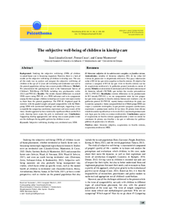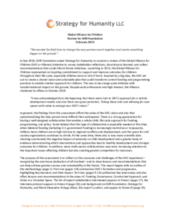Displaying 131 - 140 of 490
This book offers a comprehensive overview of the newest contributions to the literature on leaving care in relation to theory, in addition to the Theory of Emerging Adulthood, while also featuring cutting-edge research and best practices that support adjustment across a range of domains for this population.
The aim of this study was to analyse and compare the subjective well-being of children at the age of 12 years old in kinship and residential care and in the general population, taking into account gender differences.
This study draws upon data from the Bucharest Early Intervention Project (BEIP), a longitudinal study exploring the impact of severe psychosocial deprivation on child health and development to examine the relationship between telomere length and psychopathology.
This report presents the findings of a global survey designed to map current implementation of Inclusive Early Childhood Development (IECD) and Early Childhood Intervention (ECI) programs, among other objectives, and outlines recommendations based on those findings.
The goals of this study were twofold: (1) to compare the pragmatic language skills (i.e., social communication skills) of 42-month-old neglected children with those of same-aged non-neglected children and (2) to measure the prevalence of pragmatic difficulties among the neglected children.
This exploratory study investigated kinship (e.g., relative) caregivers' (N = 130) perceived and actual knowledge associated with child trauma.
At a US House of Representatives Hearing on Migrant Family Separation Policy, Jack P. Shonkoff, M.D. (Director of the Center on the Developing Child at Harvard University) gave testimony on the impacts of family separation on children, highlighting the "strong scientific consensus supported by decades of peer-reviewed research" that "sudden, forcible separation of children from their parents is deeply traumatic for both the child and the parent," triggering "a massive biological stress response."
The purpose of this assessment is to reflect on the successes and challenges of the Global Alliance for Children (GAC) experience, a large-scale initiative to support and improve outcomes for children throughout their life cycle, especially children most at risk of harm.
The current study compared behavioral and adrenocortical functioning of maltreated and comparably aged (1.5–3 years) institutionally-reared children soon after (1.5–2.5 months) placement in foster care or adoptive homes, respectively.
The objective of this study was to test the associations between parent-child separation with telomere length (TL) and psychopathology during adolescence.



